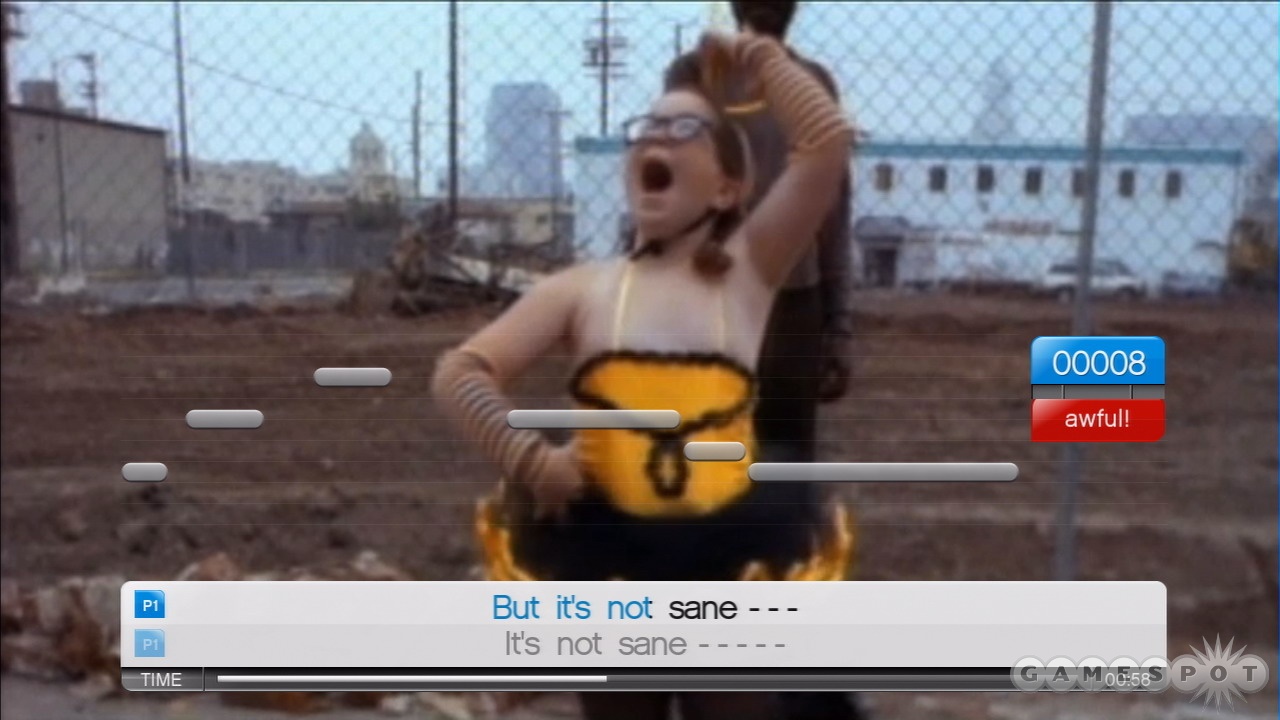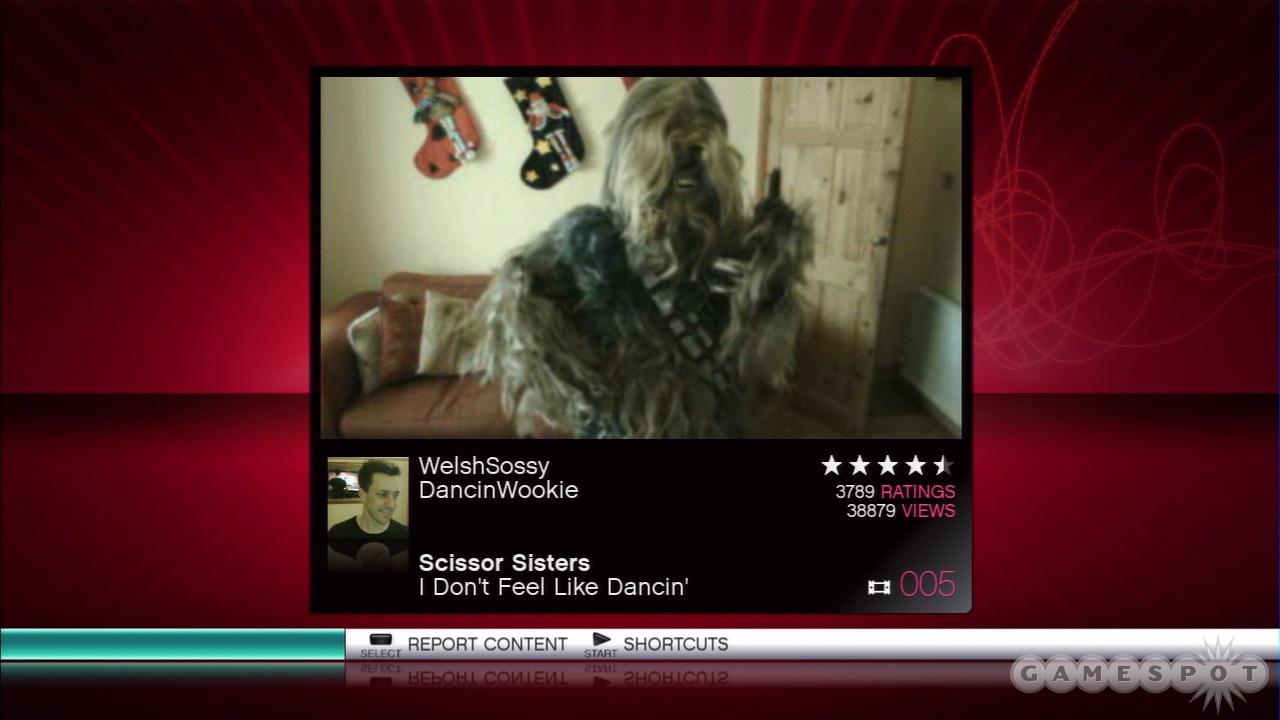Two years after it was first shown to the public, SingStar has finally been released in North America for the PlayStation 3. It's difficult to say that it was worth the wait. After all, it is just a karaoke game, and there are plenty of those already. However, it's a very good karaoke game that should please anyone who enjoys serenading friends and strangers with unsolicited performances of popular songs.
There are two versions of SingStar available: a $60 package that comes with two wired microphones and a $40 game-only version. You can save some cash by using the microphones from the PlayStation 2 versions of SingStar if you've got them handy, but those of you hoping to get some extra mileage out of Rock Band, Karaoke Revolution, or other USB mics are out of luck--they don't work. The game's tracklist is short but sweet, covering a wide variety of genres and decades. The 30 songs are performed by their original artists, including: Blind Melon, Weezer, Amy Winehouse, The Rolling Stones, Dave Matthews Band, Coldplay, U2, OutKast, Franz Ferdinand, Ne-Yo, R.E.M., The Pussycat Dolls, Warrant, The Cardigans, and more. Per article 7a from the agreement forged at the 2004 International Karaoke Summit, Britney Spears' "Toxic" is included.

Although the tracklist contains many popular karaoke staples, it's unquestionably light on quantity, given that you can breeze through every song in the game in about two hours. That's where the SingStore comes into play. For $1.50 you can purchase a song, along with its accompanying music video, and add it seamlessly to the game. At the time of this review there are about 170 songs available from artists such as: M.C. Hammer, Spice Girls, Arrested Development, KT Tunstall, Jamiroquai, Elvis, Natasha Bedingfield, Run DMC, The Hives, and many more, with additional content promised in the future.
You can't go head-to-head with anyone online, but SingStar does have a strong online component, at least from a community standpoint. You can create a profile to display your high scores, and upload audio clips of yourself crooning, along with 20-second video clips and photos if you have either the PS2 or PS3 EyeToy camera. You can even add effects and adjust your pitch before showcasing your "skills" with the world. These community features are interesting, and there do seem to be some people who are really into it, but the quality of the submissions is questionable. Even the content that users have voted as the best isn't very good and mostly features well-endowed females--though the clip of a guy in a full Chewbacca costume singing and dancing makes up for most of the terrible stuff.
The gameplay is pure karaoke, which means that you sing, your friends laugh, and then you have them sing so that you can laugh at them. All the while, the game tracks your score based on how many correct notes you hit. There are three different difficulty settings, and you can sing the full song or an abbreviated version. This is great for parties or songs such as OutKast's"Hey Ya" that get repetitive. The lyrics are shown at the bottom of the screen while horizontal lines that represent pitch are displayed above. This display method works reasonably well if you're familiar with a song, but on large televisions the pitch and lyrics are far enough apart that it can be difficult to watch both at once. The game also handles songs with rapping or spoken words in curious fashion. For example, during Faith No More's "Epic," the spoken parts are listed as "freestyle," and you can either say the words or do whatever you want because the game doesn't score freestyle sections. However, in the "rapping" portions of the downloadable Spice Girls song "Wannabe," the game shows a circular meter and scores you (rather inconsistently) based on your timing.
Though only one of the included songs, The Pussycat Dolls' "Beep," is listed as a duet, you can sing any song with another person. Depending on which mode you play, you'll sing at the same time or on alternate lines. You can play cooperatively or competitively, but don't get too competitive when comparing scores. We found that the scoring would typically vary about three to five percent between player one and player two when we would sing both parts into both microphones at the exact same time. Minor scoring quibbles aside, the game is at its best with two or more players, especially in the Pass the Mic mode, which lets two teams of up to four players each face off in different competitions. You can go head-to-head individually or in competitive duets, sing short melodies from several different songs in a rapid-fire contest, try to keep your performance bar above a certain level for the longest amount of time, be first to hit a certain score, or just battle as teams. All of the modes are enjoyable and add much-needed depth to an otherwise simple and straightforward game.

SingStar's presentation is impressive. The menus are slick, easy to navigate, and the help menu is always just a button press away. Even the online store is well designed and easy to use. The snazziest aspect of the game's presentation is that every song has a music video (or at least, footage of the artist) that plays in the background as you sing. As the singer, you probably won't get to enjoy this feature much, but it makes being a spectator much more enjoyable. The streaming music-video clips that quickly appear as you preview a song online are a nice touch, too.
A short tracklist and the fact that there are already a dozen other karaoke games out there are the only knocks against SingStar. The presentation is top-notch, and the community features are neat, despite the hit-and-miss quality of the submissions. The amount of premium downloadable content available thus far is impressive as well. You might end up spending a pretty penny downloading new tunes, but you'll probably never need to buy another karaoke game again.



